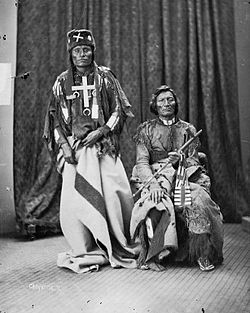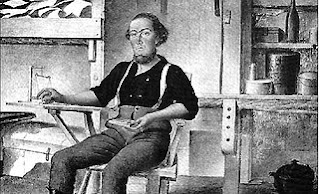Great Leader: Morning Star of the Northern Cheyenne, 1810-1883
This Cheyenne warrior and leader is more often known by his Lakota designation of Dull Knife, but among his own people where he is still revered for his courage he was known as Morning Star, 1810-1883. He was head chief of the Northern Eater band of the Northern Cheyenne and a noted chief among the Northern Cheyenne people as a whole.
The details of Morning Star's life and how he rose to prominence among his people aren't known today. He first appears in the historical record as a signatory of the Second Treaty of Laramie. Initially the Cheyenne, along with the Lakota and other tribes, agreed to severe land concessions if the Army would guarantee to keep settlers off their land. A subsequent gold rush in the Black Hills and homesteading opportunities on the Plains brought more settlers and more tension with the Native tribes. The Sioux finally revolted in 1876 and the Northern Cheyenne joined them. After the victory at the Little Bighorn/Greasy Grass in 1876, the tribes fled to Canada before returning to the United States and surrendering. The Northern Cheyenne expected to be placed on a reservation with the Lakota but were taken to Darlington Agency in Oklahoma. Unable to hunt and with reservation rations scarce to non-existent, Morning Star rallied his people and left the reservation, heading for their traditional homeland range in Montana in 1878.
Morning Star was able to evade the Army units sent to capture his people and led them through the Nebraska Sand Hills. He was eventually cornered near Fort Robinson. The warriors took apart their guns and concealed them in blankets or even as pieces of jewelry. Morning Star agreed to surrender if his people were allied to join the Lakota at Red Cloud Agency nearby. He was led to believe that his people would be allowed to live at Red Cloud Agency but began to realize that they would be taken back to Darlington. On January 8, 1879, the warriors reassembled their weapons and broke out of Fort Robinson. The Army quickly organized pursuit, killing several Cheyenne non-combatants, women and children in what became known as the Fort Robinson Massacre. Morning Star and some warriors escaped to Pine Ridge Agency, were they were held prisoner. Morning Star stood his ground about not going back to Oklahoma. Eventually, the Army agreed to a reservation in Montana Territory.
Morning Star died in 1883 and was buried in Lame Deer Cemetery on the Northern Cheyenne Reservation in Montana. Chief Dull Knife College, also in Lame Deer, is named for him. He is pictured below right, with a colleague Little Coyote standing beside him.
The details of Morning Star's life and how he rose to prominence among his people aren't known today. He first appears in the historical record as a signatory of the Second Treaty of Laramie. Initially the Cheyenne, along with the Lakota and other tribes, agreed to severe land concessions if the Army would guarantee to keep settlers off their land. A subsequent gold rush in the Black Hills and homesteading opportunities on the Plains brought more settlers and more tension with the Native tribes. The Sioux finally revolted in 1876 and the Northern Cheyenne joined them. After the victory at the Little Bighorn/Greasy Grass in 1876, the tribes fled to Canada before returning to the United States and surrendering. The Northern Cheyenne expected to be placed on a reservation with the Lakota but were taken to Darlington Agency in Oklahoma. Unable to hunt and with reservation rations scarce to non-existent, Morning Star rallied his people and left the reservation, heading for their traditional homeland range in Montana in 1878.
Morning Star was able to evade the Army units sent to capture his people and led them through the Nebraska Sand Hills. He was eventually cornered near Fort Robinson. The warriors took apart their guns and concealed them in blankets or even as pieces of jewelry. Morning Star agreed to surrender if his people were allied to join the Lakota at Red Cloud Agency nearby. He was led to believe that his people would be allowed to live at Red Cloud Agency but began to realize that they would be taken back to Darlington. On January 8, 1879, the warriors reassembled their weapons and broke out of Fort Robinson. The Army quickly organized pursuit, killing several Cheyenne non-combatants, women and children in what became known as the Fort Robinson Massacre. Morning Star and some warriors escaped to Pine Ridge Agency, were they were held prisoner. Morning Star stood his ground about not going back to Oklahoma. Eventually, the Army agreed to a reservation in Montana Territory.
Morning Star died in 1883 and was buried in Lame Deer Cemetery on the Northern Cheyenne Reservation in Montana. Chief Dull Knife College, also in Lame Deer, is named for him. He is pictured below right, with a colleague Little Coyote standing beside him.




Comments
Post a Comment